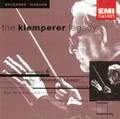


Bruckner composed his Sixth Symphony between 1879 and 1881, but the first complete performance (conducted by Gustav Mahler) only took place three years after his death. Bruckner called his Sixth Symphony his boldest. It certainly is one of the greatest, but it is not as frequently performed as the Fourth and Seventh. Perhaps the reason is that the Finale is inferior to the perfect first three movements. In spite of this, Bruckner, who usually made several revisions of his works, didnít make any change to this symphony. The composerís student C. Hynais slightly revised the original score for the publication by Doblinger in 1899. Although Hynais work was careful, the final printed text contained many errors and changes introduced by an unknown hand. Today, most conductors perform the original score edited by Haas or Nowark.

 Otto Klemperer
Otto Klemperer


Klempererís powerful account of the Sixth Symphony is among the most convincing of his Bruckner performances. With the Philharmonic Orchestra on top form, he brings a tautly incisive, electronically intense reading, marked by speeds faster than usual that yet have the ring of authenticity. Kelmperer creates a expansive atmosphere in the first movement to give the writing its full emotional thrust, and the hushed tension of the slow movement leads up to a beautiful climax. The 1960ís recording is clear, bright and full-blooded.

 Sergiu Celibidache
Sergiu Celibidache


Celibidache directs an amiable reading, not as brilliant or precise in ensemble as the finest but warm and convincing, with some wonderful playing. He steers an ideal course between expressive warmth and architectural strength. At slower speeds than usual, Celibidacheís rhythmic lift both in the slow movement and in the finale brings exhilarating results, sparkling and swaggering. Throughout, Celi has an unerring sense of purpose and the momentum never slackens.

Other Recommendations:
Georg Tintner

